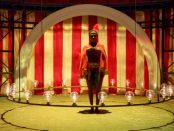The Pershing Square Signature Center
The Pershing Square Signature Center, Signature Theatre Company’s new Frank Gehry-designed home on 42nd Street, is one of New York’s most exciting additions to the cultural landscape. Signature Theatre Company is located at: The Pershing Square Signature Center, 480 West 42nd Street. http://www.signaturetheatre.org
Elliott has directed too realistically, turning "Curse" into a sad melodrama, minus the magic. Maybe Shepard’s odd take on rural goings-on had more of a shocking appeal to sophisticated urban audiences back in the seventies before TV series about Yellowstone and Fargo, filled with their own weirdness, effaced the darkness of Shepard’s characters and plots. [more]
Orlando
While the ensemble cast is excellent throughout, we do feel Taylor Mac’s absence when he goes offstage to change costumes (and that is quite a few times, one more sumptuous than the other – though not rivalling what goes on at a Cher concert). Most importantly the “new gender reveal” in Constantinople also occurs offstage. Inhabiting Orlando as a woman, Mac gives us one of the most heartfelt realizations, “How odd. When I was a young man, I insisted that women be obedient, chaste and scented. Now I shall have to pay in my own person for those desires. For women are not…obedient, chaste and scented by nature. They can only attain these graces by tedious discipline. There’s the hairdressing…that alone will take at least an hour of my morning…there’s looking in the looking glass…there’s being chaste year in and year out…Christ Jesus.” [more]
20 Seconds: A Play with Music
Sweitzer inhabits over a dozen characters in this play entitled "20 Seconds: A Play with Music," albeit two of them are him when young and him telling us the story now…two people he knows intimately. He is never so broad as to suggest caricature. His female characters are vibrant and flesh-and-blood enough for you to suspend disbelief that you aren’t actually seeing his mom Kathy, and Erdean, and Ms. Ruth, the fleabag hotel manager, and Denise, the girl next door, and finally his creation, Vivian Delgrosso, a drag homage to the Italian women his mom’s age. He brings the same depth to his male characters, with the masterpiece being his sadistic, yet eventually repentant father Tom. [more]
Pay the Writer
Directed by Karen Carpenter, "Pay the Writer" by best-selling novelist Tawni O’Dell is slick and superficial but entertaining and engrossing. The play about the 45 year friendship between an ultimately successful gay literary agent and an unknown African American novelist who becomes celebrated and wealthy plays like a novel or mini-series with its 13 scenes and many two-character encounters but is ultimately satisfying by the time it reaches its denouement. The high powered cast plays it to the hilt, belying the fact that the characters are superficial and stereotyped, which, of course, doesn’t make it untrue. Some of the play is extremely funny with one-liners worth repeating. [more]
The Comeuppance
Branden Jacobs-Jenkins’ "The Comeuppance," the culmination of his decade as a Premiere Resident playwright at Signature Theatre, does for the millennials what "The Big Chill" did for the Baby Boomers. Astutely directed by Eric Ting, this fascinating but uneven play also reviews the stresses and traumas of the last 20 years for that generation. This five-character reunion of people who knew each other at St. Anthony, class of 2002, in Prince George’s County, Maryland, is densely plotted and packed with dramatic moments. And then there is a new wrinkle, an uninvited guest. [more]
The Watering Hole
There are installations, written words, video projections, and recorded spoken word. One setting is intended as a break area where patrons can dance or play with beachballs. Other interactive projects involve writing answers to questions and pinning them to a piece. To give specific descriptions of these clever inventions would be to spoil surprises. This one is memorable and representative of the exhibition. [more]
Bob & Carol & Ted & Alice
Bookwriter Jonathan Marc Sherman has wisely kept the story in its period. However, his dialogue is almost word for word lifted from the screenplay which is rather old hat for those of us have heard it in the movie. The score with music by Sheik and lyrics by Sheik and Amanda Green makes all the songs sound the same in Sheik’s orchestration played by a combo of four. The lyrics are both pedestrian and trite, telling us only what we already know. The songs which are not listed in the program include a great many reprises. Many of the tableaux and setups recreate exact visual moments from the film. [more]
one in two
Leland Fowler, Jamyl Dobson and Edward Mawere in a scene from Donja R. Love’s “one in two” in [more]
Octet
Malloy, who wrote the book, music and lyrics, has taken a novel approach, staging Octet as if it were a 12-step program in which all the members of the group express their inner thoughts through a cappella singing all the while following the precepts of an AA or OA meeting. Annie Tippe has taken this sophisticated mass of brilliance and shaped it around the sensational talents of a small cast which performs miracles of acting and singing. [more]
“Daddy”
Jeremy O. Harris’ “Daddy” is the work of a unique voice, a little self-indulgent in its length, and a little underwritten in its characterizations. It attempts to shock with its use of nudity and sadomasochistic sex, but nothing we have not seen before. The play’s message is not entirely clear but the play is provocative nevertheless. It is a work for the mature playgoer who wants to see a new direction that our theater is heading. [more]
Boesman and Lena
The production of "Boesman and Lena" at The Pershing Square Signature Center directed with attention to every detail by Yaël Farber is stark and unforgiving in a way that would have been shocking in 1970. Even though apartheid has been lifted, this play still resonates with its bleak display of human survival in the face of unimaginable terrors and its condemnation of racial inequity. [more]
Clueless, The Musical
While "Clueless, The Musical" is never less than slick and professional in the best possible way, for those who know the iconic film it offers no surprises so slavishly does it follow the original storyline. What was charming in the 1995 movie about Cher’s sense of superiority and wishing to help others less fortunate is no longer as acceptable. What was amusing in the era of excess now seems selfish, elitist, and an example of extravagant wastefulness. Alicia Silverstone’s appeal in the film doesn’t carry over to the musical where Dove Cameron, Disney star of Liv and Maddie, comes across as spoiled rotten by her wealthy single parent father who has given her pretty much everything she wants. [more]
Fabulation, or The Re-Education of Undine
A hard-edged picaresque fable is what playwright Lynn Nottage came up with in her enjoyable, "Fabulation, or The Re-Education of Undine" that premiered in 2004. A two-time Pulitzer-Prize winner for Drama, Ms. Nottage is in a lighter mood here but her comic sequences have a bracing tone and the dialogue has her customary skillful depth. We’re in the exaggerated territory of "Watermelon Man" and "Bonfire of the Vanities." [more]
Because I Could Not Stop: An Encounter with Emily Dickinson
Stranger still is the choice of Angelica Page to play Dickinson who looks rather too healthy to be the famously thin and sallow-faced writer known from the one famous photograph. She makes Dickinson sarcastic, arrogant, cynical, self-important and haughty which goes against the voice of the woman in the poems. At times she has been given arty stage directions like posing by a mantelpiece or sleeping on the ground next to what we assume is alongside of her father’s grave. [more]
Be More Chill
"Be More Chill" is an impressive musical version of Ned Vizzini’s cult novel. Not only does it reproduce the plot on stage, it also gives it a high tech look that dramatizes the story where the novel left it to the imagination. Joe Iconis, long thought to be one of the most promising new theater composers, makes good on that promise, and Joe Tracz demonstrates for a second time that he can put difficult material on the stage. While Ryan Rumery’s overly loud sound design will turn off older theatergoers who are not more chill, those in the swing of things will have a memorable evening in the musical theater. [more]
Tchaikovsky: None but the Lonely Heart
The letters alternate with the musical portions played by Ji on piano, Ari Evan on cello and Stephanie Zyzak on violin in various combinations which are beautiful but it is never clear in what way the selections relate to Madame von Meck except for the Piano Trio in A minor, op. 50, which Tchaikovsky reveals at the beginning of the second act that he is writing for her. It is not stated whether the two excerpts from The Nutcracker, for violin and piano, and for solo piano were created for her. [more]
Our Lady of 121st Street
The current staging of "Our Lady" at The Pershing Square Signature Center, directed by Phylicia Rashad, magically now comes across as an addled, profane sitcom. It’s entertaining and at times moving, but the real magic is that the very same words can be tended by a solid director—this one obviously experienced in sitcoms—and refresh a theatrical experience so completely. Rashad has shown that scathing can be scathingly funny. This time I left laughing. [more]
Peace for Mary Frances
We learn a great deal about hospice, possibly more than one might want to know in a play. While most death watch plays like Edward Albee’s "All Over" and Scott McPherson's "Marvin’s Room," take place in another room from where the elderly person is dying, Mary Frances alternates between the downstairs living room/dining room and the upstairs bedroom of her split-level house. Unfortunately, this 21-scened play with at least a dozen more scenes which switch between Mary Frances’ bedroom and the living room where the rest of the family eat or watch television requires endless jump cuts like a film and endless lighting cues from designer Tyler Micoleau. [more]
Paradise Blue
In many ways Dominique Morisseau’s "Paradise Blue" shares similarities with August Wilson’s brilliant, if long-winded, Pittsburgh based plays. "Blue" is part of Morisseau’s Detroit Project, a three-play cycle that takes place in three different eras. Blue, developed with the aid of the Williamstown Theatre Festival, the Public Theater and the McCarter Theatre is a snapshot of desperate people occupying a part of Detroit on the verge of vast changes—read gentrification. [more]
Good for Otto
Except for the frustration level of the characters, there does not seem to be a movement towards change or catharsis which may partly explain why the play seems so long. Harris and Madigan retain their cool as therapists throughout until almost the end when they can’t hold in their emotions any more. The most dramatic story is that of 12-year-old Frannie beautifully and realistically played by young Rileigh McDonald. However, as written the role of her foster mother played by Rhea Perlman is a one-note tale and doesn’t give her much wiggle room to make it her own. [more]
Jerry Springer – The Opera
"Jerry Springer - The Opera" is not for opera purists nor is for people who are easily offended by four letter words and other bad language of which there is a multitude. However, its irreverence skewers social, religious and political hypocrisy. The New Group’s production directed by John Rando is one of the most exciting musical theater experiences to be currently obtained in New York. It actually seems more relevant in Trump America where this sort of thing is cable-fodder every night of the week. If you are a dedicated theatergoer, miss this show if you dare. [more]
Edward Albee’s At Home at the Zoo: Homelife & The Zoo Story
Lila Neugebauer has directed these two one-acts to bring out their naturalism. In the past, "The Zoo Story" was usually performed with an odd, surreal quality. Neugebauer has given the conversations a flow that reveals this play to be about people, not walking symbols, a lesson Albee had thoroughly absorbed by the time he wrote "Who’s Afraid of Virginia Woolf?" [more]
Mary Shelley’s Frankenstein
Fairchild speaks well and communicates much with his physique, but his choreography is repetitive and uninventive. Here was a chance to breathe new life into a too familiar character. All Fairchild could come up with is lurching movements and awkward falls to the floor. He takes the obvious path to create his character with movement when he had a chance to illuminate the Monster’s inner emotions. [more]
Downtown Race Riot
Anton Chekhov once advised that if you show an audience a gun you are required to have it go off. Set on September 8, 1976, Seth Zvi Rosenfeld’s new play, "Downtown Race Riot," being given it world premiere by The New Group, never takes us to this forgotten event which happened in Washington Square Park but depicts the forces and people involved in the 100 minutes before the riot is to happen. This overheated melodrama which goes on a bit long takes on many important themes (racial hatred, drug addiction, petty crime, sexual identity, financial insecurity, etc.) without making any pertinent point about any of them. While the dialogue and the milieu are gritty, Downtown Race Riot recycles a great many stereotypes and clichés. [more]
20th Century Blues
There is nothing much very wrong with Susan Miller’s '20th Century Blues" that a few more revelations or dustups wouldn’t solve. Beth Dixon, Franchelle Stewart Dorn, Polly Draper, Kathryn Grody and Ellen Parker play believable, recognizable women at a plateau in their lives when some taking stock is in order as they approach the age of being considered senior citizens. A pleasant evening in this form, but Miller’s play gives an aftertaste that will leave you hungry for more. It seems that in order not to offend, she is playing it too safe. [more]
Jesus Hopped the ‘A’ Train
Guirgis and Brokaw manage to find the back-handed humor and pathos of this scene which sets the mood for a profane and scatological play that hits the audience between the eyes with its fresh use of language and its deep understanding of the two main characters. Guirgis turns profanity into a poetic x-ray of the human psyche. [more]
Van Gogh’s Ear
Projected titles indicate place and year—beginning with Arles, 1888 and progressing until van Gogh’s suicide—which we hear as an offstage gunshot—in July of 1890. The audience is treated to Vincent’s thoughts on his painting technique, his poverty, his mental health, his fellow artists, stars, sunflowers, all interrupted by chamber music by Debussy, Fauré, Chausson and Franck played—in various combinations—by Henry Wang (violin), Yuval Herz (violin), Chich-Fan Yiu (viola), Timotheos Petrin (cello), Max Barros (piano) and Renana Gutman (piano). [more]
Of Human Bondage
Director Albert Schultz’s program note explains that the production set itself two challenges: first, that Philip Carey would never leave the 16-foot red square center stage, and that all of the sound (vocal, musical or atmospheric) would be made by the 11 other actors in view of the audience. This may have made for an interesting artistic experiment, but it is not so effective for the audience. While the 16-foot square makes the play claustrophobic (a metaphor for Philip’s life), it also means that scenery has to be carted around for each and every scene. Nevertheless, in Lorenzo Savoini’s clever set design, the transitions between the many scenes are smooth and flowing. The sound effects are made by the actors on stage ultimately become very distracting from the action of the play. Faithful to the novel but necessarily telescoped, Thiessen’s adaptation is fragmented into a series of vignettes which though not disjointed suggest that much is missing. [more]
The Whirligig
Say this for actor Hamish Linklater: he writes juicy parts for his fellow actors. He also knows how to set up a sense of community. The New Group production directed by its artistic director Scott Elliott has a fine cast led by two-time Tony Award winner Norbert Leo Butz and Zosia Mamet, just off six seasons of the recently ended HBO television series, Girls. [more]
Venus
The adept cast is led by Zainab Jah in the title role. In the one detail in which Parks’ play matches "The Elephant Man," Ms. Jah, a shapely, lovely actress, transforms herself into Venus right in front of the audience, painfully pulling on a padded costume that leaves nothing to the imagination. Ms. Jah’s Venus is a strong figure who rolls with the punches but is no match for the hypocrisy of the powers that be. She is a strong enough actor to keep her head above the fray. [more]
The Antipodes
Every new play by Annie Baker is a marvel over the play before. It’s been nothing less than a privilege to accompany her on her journey, as she has been joining ranks with the best American playwrights. Part of what makes Baker the “best,” is that she has her own voice. Whether with "Circle-Mirror Transformation," the marvelous "The Flick," or her latest and current, "The Antipodes," Baker seems to devote a certain amount of attention to group dynamics, which is, after all, the basis of any drama. And how can I have left out reference to John, Baker’s play from last year, which was her first as part of her enrollment with the Signature Theater, and arguably the best of all? [more]
Wakey, Wakey
"Wakey, Wakey" is Will Eno at his surreal, troubling, beautiful best, a play both challenging and easily absorbed. He truly approaches the unapproachable: the meaning of life. [more]
All the Fine Boys
Playwright Erica Schmidt has a minor aptitude for believably snappy dialogue, but not much else. Her tired scenario is astonishingly familiar and offers no fresh insights. That adolescence is tough is about all there is. That territory has been mined in John Hughes’ films and numerous television shows. There was also the 1985 movie "Smooth Talk," starring Laura Dern and Treat Williams that was based on a Joyce Carol Oates short story. [more]

































